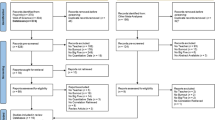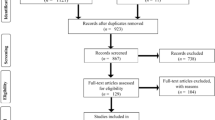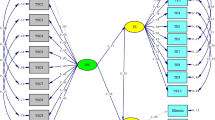Abstract
This study examined differences between teachers high and low in burnout in the perception of being superior to others. Because burnout implies a decline in well-being and because well-being is related to perceived superiority, it was hypothesized that perceived superiority would be reduced among individuals high in burnout. This would be particularly true for superiority with respect to positive behaviors (feeling better than others). As negative behaviors of others are generally highly salient, it was expected that even individuals high in burnout would be able to maintain a sense of negative superiority (feeling less bad than others). One hundred twenty teachers in secondary education were asked to generate information about inferior and superior others. Perceived superiority was assessed by response latencies and the quality of the information generated. As expected, only positive superiority was reduced among teachers high in burnout. Thus, they felt less good, but also less bad than others. Consequences for classroom performance and suggestions for the treatment of burnout are discussed.
Similar content being viewed by others
References
Abel, Millicent H. & Sewell, Joanne (1999). Stress and burnout in rural and urban secondary school teachers. Journal of Educational Research, 92(5), 287–293.
Allan, Steven & Gilbert, Paul (1995). A social comparison scale: Psychometric properties and relationship to psychopathology. Personality and Individual Differences, 19, 293–299.
Alicke, Mark D. (1985). Global self-evaluation as determined by the desirability and controllability of trait adjectives. Journal of Personality and Social Psychology, 49, 1621–1630.
Allison, Scott T., Messick, David M., & Goethals, George R. (1989). On being better but not smarter than others: The Muhammad Ali effect. Social Cognition, 7, 275–296.
Alloy, Lauren B. & Ahrens, Anthony H. (1987). Depression and pessimism for the future: Biased use of statistically relevant information in predictions for self versus others. Journal of Personality and Social Psychology, 52, 366–378.
Block, Jack & Colvin, C. Randall (1994). Positive illusions and well-being revisited: Separating fiction from fact. Psychological Bulletin, 116(1), 28.
Boyle, Gregory J., Borg, Mark G., Falzon, Joseph M., & Baglioni, Anthony J. (1995). A structural model of the dimensions of teacher stress. British Journal of Educational Psychology, 65, 49–67.
Brenninkmeijer, Veerle & VanYperen, Nico W. (1999). Diagnostiek van burnout door middel van de Utrechtse Burnout Schaal (Diagnosing burnout by means of the Utrechtse Burnout Schaal). Nederlands Tijdschrift voor de Psychologie, 54, 105–108.
Brenninkmeijer, Veerle, VanYperen, NicoW., & Buunk, Bram P. (2001). Burnout and depression are not identical twins: Is decline of superiority a distinguishing feature? Personality and Individual Differences, 30, 873–880.
Brown, Jonathon D. (1986). Evaluations of self and others: Self-enhancement biases in social judgment. Social Cognition, 4, 353–376.
Burke, Ronald J. & Greenglass, Esther (1995). A longitudinal study of psychological burnout in teachers. Human Relations, 48(2), 187–202.
Buunk, Bram P. & Brenninkmeijer, Veerle (1999). Social comparison processes among depressed individuals: Evidence for the evolutionary perspective on involuntary subordinate strategies? In L. Sloman & P. Gilbert (Eds.), Subordination and defeat: An evolutionary approach to mood disorders and their therapy. Mahwah, NJ: Erlbaum, pp. 147–164.
Buunk, Bram P. & Van den Eijnden, Regina J.J.M. (1997). Perceived prevalence, perceived superiority, and relationship satisfaction: Most relationships are good, but ours is better. Personality and Social Psychology Bulletin, 23, 219–228.
Buunk, Bram P. & VanYperen, Nico W. (1991). Referential comparisons, relational comparisons, and exchange orientation: Their relation to marital satisfaction. Personality and Social Psychology Bulletin, 17, 709–717.
Byrne, Barbara M. (1999). The nomological network of teacher burnout: A literature review and empirically validated model. In R. Vandenberghe & A.M. Huberman (Eds.), Understanding and preventing teacher burnout: A sourcebook of international research and practice. New York: Cambridge University Press, pp. 15–37.
Colvin, C. Randall & Block, Jack (1994). Do positive illusions foster mental health? An examination of the Taylor and Brown formulation. Psychological Bulletin, 116(1), 3–20.
De Heus, Peter & Diekstra, René F.W. (1999). Do teachers burn out more easily? A comparison of teachers with other social professions on work stress and burnout symptoms. In R. Vandenberghe & A.M. Huberman (Eds.), Understanding and preventing teacher burnout: A sourcebook of international research and practice. New York: Cambridge University Press, pp. 269–284.
Dworkin, Anthony G. (1997). Coping with reform: The intermix of teacher morale, teacher burnout, and teacher accountability. In B.J. Biddle, T.L. Good, & I.F. Goodson (Eds.), The international handbook of teachers and teaching, (Vol. 1). Dordrecht, The Netherlands: Kluwer Academic Publishers, pp. 459–498.
Fazio, Russell H. (1990). A practical guide to the use of response latency in psychological research. In C. Hendrick & M.S. Clark (Eds.), Review of personality and social psychology (Vol. 11): Research methods in personality and social psychology. Newbury Park, CA: Sage, pp. 74–97.
Fischer, Harvey J. (1983). A psychoanalytic view on burnout. In B.A. Farber (Ed.), Stress and burnout in the human service profession. New York: Pergamon Press.
Forgas, Joseph P. (1998). Asking nicely? The effects of mood on responding to more or less polite requests. Personality and Social Psychology Bulletin, 24, 173–185.
Friedman, Isaac A. (1991). High-and low-burnout schools: School culture aspects of teacher burnout. Journal of Educational Research, 84(6), 325–333.
Friedman, Isaac A. & Farber, Barry A. (1992). Professional self-concept as a predictor of teacher burnout. Journal of Educational Research, 86(1), 28–35.
Greenglass, Esther R., Burke, Ronald J., & Konarski, Roman (1998). Components of burnout, resources, and gender-related differences. Journal of Applied Social Psychology, 28(12), 1088–1106.
Headey, Bruce & Wearing, Alex (1988). The sense of relative superiority-central to well-being. Social Indicators Research, 20, 497–516.
Hofstede, Geert (1980). Culture's consequences: International differences in work-related values. Beverly Hills, CA: Sage.
Hoorens, Vera (1993). Self-enhancement and superiority biases in social comparison. In W. Stroebe & M. Hewstone (Eds.), European Review of Social Psychology (Vol. 4). Chichester: Wiley, pp. 113–139.
Karasek, Robert & Theorell, Töres (1990). Healthy work: Stress, productivity, and the reconstruction or working life. New York: Basic Books.
Major, Brenda, Testa, Maria, & Bylsma, Wayne H. (1991). Responses to upward and downward social comparisons: The impact of esteem-relevance and perceived control. In J. Suls & T. A. Wills (Eds.), Social comparison: Contemporary theory and research. Hillsdale, NJ: Lawrence Erlbaum pp. 237–260.
Malkinson, Ruth, Kushnir, Talma, & Weisberg, Esther (1997). Stress management and burnout prevention in female blue-collar workers: Theoretical and practical implications. International Journal of Stress Management, 4, 183–197.
Martijn, Carolien, Spears, Russel, Van der Pligt, Joop, & Jakobs, Esther (1992). Negativity and positivity effects in person perception and inference: Ability versus morality. European Journal of Social Psychology, 22, 453–463.
Maslach, Christina & Jackson, Susan E. (1981). The measurement of experienced burnout. Journal of Occupational Behaviour, 2, 99–113.
Meyer, Herbert H. (1980). Self-appraisal of job performance. Personnel Psychology, 33, 291–295.
Rudow, Bernd (1999). Stress and burnout in the teaching profession: European studies, issues, and research perspectives. In R. Vandenberghe & A. M. Huberman (Eds.), Understanding and preventing teacher burnout: A sourcebook of international research and practice. New York: Cambridge University Press, pp. 38–58.
Russell, Daniel W., Altmaier, Elizabeth, & Van Velzen, Dawn (1987). Job-related stress, social support and burnout among classroom teachers. Journal of Applied Psychology, 72, 269–274.
Schaufeli, Wilmar B., Daamen, John, & Van Mierlo, Hanneke (1994). Burnout among Dutch teachers: An MBI-validity study. Educational and Psychological Measurement, 54, 803–812.
Schaufeli, Wilmar B. & Van Dierendonck, Dirk (1995). A cautionary note about the cross-national and clinical validity of cut-off points for the Maslach Burnout Inventory. Psychological Reports, 76, 1083–1090.
Schaufeli, Wilmar B., Van Dierendonck, Dirk, & Van Gorp, Karin (1996). Burnout and reciprocity: Towards a dual level social exchange model. Work & Stress, 10, 225–237.
Schaufeli, Wilmar B. & Van Horn, Joan E. (1995). Maslach Burnout inventory: Nederlandse versie voor leerkrachten (MBI-NL-Le). Voorlopige handleiding. (Maslach Burnout Inventory: Dutch version for teachers (MBI-ML-Le). Preliminary manual). Internal report, Section Psychology of Work, Health, and Organization, University of Utrecht, The Netherlands.
Shirom, Arie (1989). Burnout in work organizations. In C. L. Cooper & I. T. Robertson (Eds.), International review of industrial and organizational psychology. Chichester, UK: Wiley, pp. 25–48.
Skowronski, John J. & Carlston, Donald E. (1989). Negativity and extremity biases in impression formation: A review of explanations. Psychological Bulletin, 105, 131–142.
Taylor, Shelley E. & Brown, Jonathon D. (1988). Illusion and well-being: A social psychological perspective on mental health. Psychological Bulletin, 103, 193–210.
Taylor, Shelley E. & Brown, Jonathon D. (1994). Positive illusions and well-being revisited: Separating fact from fiction. Psychological Bulletin, 116(1), 21–27.
USZO, Uitvoeringsinstelling Sociale Zekerheid voor Overheid en Onderwijs (Benefits Agency for the Public Service and Education Sector) (1998). Statistiek Arbeidsongeschiktheid, Onderwijs (Statistics Incapacity for Work, Education). The Netherlands: Author.
Van de Vliert, Evert (1998). Gender role gaps, competitiveness and temperature. In G. Hofstede (Ed.), Masculinity and femininity: The taboo dimension of national cultures. Thousand Oaks, CA: Sage Publications, pp. 117–129.
Van Horn, Joan E., Schaufeli, Wilmar B., Greenglass, Esther R., & Burke, Ronald J. (1997). A Canadian-Dutch comparison of teachers' burnout. Psychological Reports, 81, 371–382.
Van Lange, Paul A. M. & Breukelaar, Harry G. D. (1992). Waargenomen superioriteit: beter, maar vooral minder slecht dan anderen (Perceived superiority: Better, but particularly less bad than others). In J. Van der Pligt, N. Ellemers, W. Van der Kloot, & M. Poppe (Eds.), Fundamentele sociale psychologie (Vol. 6). Tilburg, The Netherlands: Tilburg University Press, pp. 113–126.
Van Lange, Paul A. M. & Rusbult, Caryl E. (1995). My relationship is better than - and not as bad as - yours is: The perception of superiority in close relationships. Personality and Social Psychology Bulletin, 21, 32–44.
VanYperen, Nico W. (1992). Self-enhancement among major league soccer players: The role of importance and ambiguity on social comparison behavior. Journal of Applied Social Psychology, 22, 1186–1198.
VanYperen, Nico W. (1996). Communal orientation and the burnout syndrome among nurses: A replication and extension. Journal of Applied Social Psychology, 26(4), 338–354.
VanYperen, Nico W., Buunk, Bram P., & Schaufeli, Wilmar B. (1992). Imbalance, communal orientation and the burnout syndrome among nurses. Journal of Applied Social Psychology, 22, 173–189.
Wagenvoort, Mirjam A., VanYperen, NicoW., Hoogduin, Cees A. L., & Schaap, Cas P. D. R. (1998). Persoonskenmerken en burnout: De mediërende rol van copingstijl (Personality characteristics and burnout: The mediator role of coping style). Nederlands Tijdschrift voor de Psychologie, 53, 128–143.
WHO (1992). The ICD-10 classification of mental and behavioural diseases: Clinical description and diagnostic guidelines. Geneva: Author.
Weinstein, Neil D. (1980). Unrealistic optimism about future life-events. Journal of Personality and Social Psychology, 39, 806–820.
Author information
Authors and Affiliations
Corresponding author
Rights and permissions
About this article
Cite this article
Brenninkmeijer, V., Vanyperen, N.W. & Buunk, B.P. I am Not a Better Teacher, But Others are Doing Worse: Burnout and Perceptions of Superiority Among Teachers. Social Psychology of Education 4, 259–274 (2001). https://doi.org/10.1023/A:1011376503306
Issue Date:
DOI: https://doi.org/10.1023/A:1011376503306




